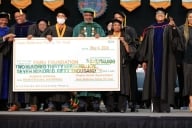You have /5 articles left.
Sign up for a free account or log in.
The Institute for a Competitive Workforce at the U.S. Chamber of Commerce issued a report Monday that explored the potential for innovation in higher education, mostly in the for-profit sector, and what it sees as the barriers, including federal regulation, constrained state budgets and accreditation policies. The report, "College 2.0: Transforming Higher Education through Greater Innovation and Smarter Regulation," promotes for-profit colleges and partnerships as well as some nonprofit innovations as solutions to increasing productivity, effectiveness and cost-efficiency and reaching the goal of being the world's best-educated country by 2020. It singles out several new ventures as examples, including StraighterLine, the company that offers online courses at a low price, and Western Governors University, the online competency-based nonprofit that state university systems in Indiana and Washington have recently embraced.
Margaret Spellings, the U.S. secretary of education under President George W. Bush who now serves as an adviser to the Chamber of Commerce, said the report, and an accompanying forum Monday, during which executives of for-profit colleges and others shared their thoughts on the role of for-profit institutions in innovation, were the beginning of an increased effort by the chamber to increase its visibility and activism on higher education issues.









